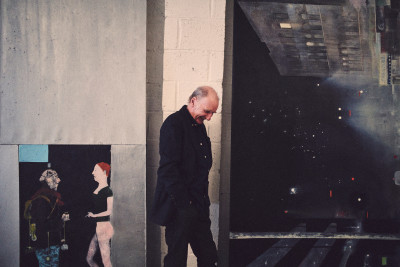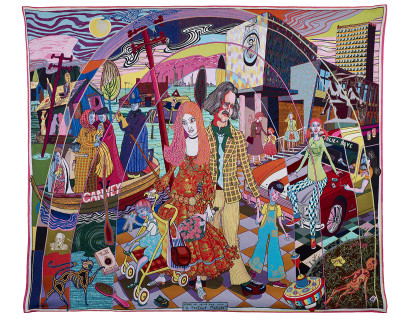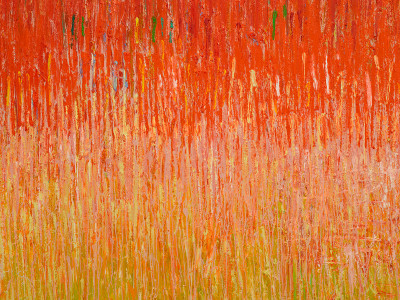Peter Doig, Rachel Howard, and the architect of Georgian Britain
Peter Doig, Rachel Howard, and the architect of Georgian Britain
Our pick of this week's art events
By Tom Jeffreys
Published 21 March 2014
From Freudian installations to Georgian architecture: everything worth seeing in the world of art this week.
-
Peter Doig: Early Works
Michael Werner, London, 20 March – 31 May 2014
Those accustomed to the ethereal, dreamtime symbolism of Peter Doig’s paintings of canoes and woodland scenes may be surprised by this exhibition of early works by the Scottish artist. Having been well-received at Michael Werner’s New York space in November, the exhibition arrives this week in London; an unexpected riot of urban energy and pop culture iconography. After such early exuberance, the seeds of Doig’s later, auction-topping style begin to emerge from 1986.
-

Peter Doig, New York, 1980.
India ink, watercolour on paper. 29 x 41 cm.
-
Miroslaw Balka: Die Traumdeutung 25,31m AMSL
White Cube, Mason’s Yard, London, 21 March – 31 May 2014
A twin solo show for Polish-born conceptual artist Misolaw Balka across White Cube’s Mason’s Yard space and the Freud Museum in Hampstead) in Hampstead. Balka is known to London audiences for How It Is, a giant steel structure with a dark, cavernous interior installed in the Turbine Hall at Tate Modern in 2010, and this is his first showing in the capital since then. Both shows span sculpture and installation, and draw upon Freud’s seminal The Interpretation of Dreams. The titles, incidentally, refer to the exact geographical height in metres above sea level of the two galleries.
-

Artist’s impression of Above your head (2014) © Miroslaw Balka
-
Last chance: Rachel Howard: Northern Echo
Blain Southern, 7 February – 22 March 2014
Closing this Saturday is an extraordinary exhibition of new works by the increasingly celebrated Rachel Howard. This latest series of paintings, all dating from 2013, continue the artist’s experiments with household gloss paint: primarily monochromatic, but with faded tints of lurid neon seeping through at the edges. For me, Howard’s large-scale floral works are less intriguing than the smaller pieces, in which black calligraphic lines demarcate platelets of paint, underpinned or overlaid in places with echoes of figuration – a bridge, a tree, a shallow watery shimmer. Arguably her finest work yet.
-

Rachel Howard, Bridge (beach banks), 2013.
Oil and acrylic on canvas. 76.2 x 91.4 cm. Photo: Prudence Cummings Associates Ltd, 2013. Image courtesy of the artist and Blain|Southern, and copyright the artist..
-
William Kent: Designing Georgian Britain
Victoria and Albert Museum, 22 March – 13 July 2014
This major exhibition celebrates the life and works of William Kent, the leading architect and designer of early Georgian Britain. The exhibition showcases the diversity of Kent’s output – across everything from sculpture to metalwork, theatrical design and landscape gardens – and argues for his enduring significance. Two of his best known works are Holkham Hall in Norfolk, and Stowe in Buckinghamshire, while visitors to the RA may be familiar with Kent’s work here in Burlington House, where two of his ceiling paintings still survive. These three examples of his work are explored in more depth by William Palin’s The genius of Kent, an article originally published in RA Magazine.
-

William Kent, Design for the south front, Holkham Hall, 1731-34.
pen and ink, brown wash. By permission of Viscount Coke and the Trustees of the Holkham Estate. Photographer, Bruce White.
-
Last chance: Nina Canell: Near Here
Camden Arts Centre, London, 17 January – 30 March 2014
I first came across the work of Nina Canell at Cubitt in Islington in 2012 when she had a solo show focused around Dmitri Mendeleev’s conception of the periodic table in the late 1860s. This exhibition of new work at Camden Arts Centre is less historically precise in its origins, and introduces an element of site-specificity as Canell responds to the architecture of the Grade II listed building. Nonetheless, Near Here continues the artist’s interest in the apparently insignificant – electrical currents, stray socks, chewing gum – and her elegant, pared-back aesthetic approach.
-

Installation view of Nina Canell: Near Here at Camden Arts Centre, 2014.
Photo: Marcus J Leith








